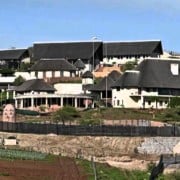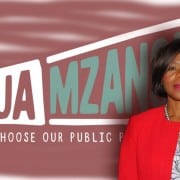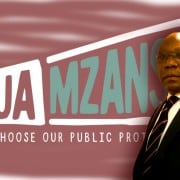|
Getting your Trinity Audio player ready...
|
Corruption Watch today launched a mass public awareness and mobilisation campaign, Bua Mzansi, in a bid to ensure that the Office of the Public Protector remains a safely guarded cornerstone of South Africa’s democracy when the new public protector takes office later this year.
The launch took place at Constitution Hill, the seat of South Africa’s democratic processes.
The current public protector, Thuli Madonsela, ends her term on 19 October 2016. Madonsela has earned widespread respect here and abroad for her commitment to tackling corruption, and to holding government accountable for the quality and performance of its administration, without fear or favour.
The public protector’s seven-year term of office may not be renewed. Corruption Watch is not looking for a replacement, Lewis stressed, and will not support any particular candidate, but is rather raising awareness of the public’s right to participate.
“We will strive to take advantage of the unusual degree of space in the appointment of the public protector for the public to get involved and participate,” said the organisation’s executive director David Lewis, speaking at the launch.
The Bua Mzansi campaign will consist of three elements – awareness, which includes the public education aspect; motivation for public participation in the nomination, interviewing and appointment; and transparency throughout the process.
“We’re starting to talk to people about what this office means, what it does, how the recruitment process happens, how the appointment process happens and hopefully we will spark a debate – formal qualifications aside – about what kind of character is needed in our public protector,” said Lewis.
The office of the Public Protector came into being on 1 October 1995, and Selby Baqwa was the first incumbent. He was appointed by then-president Nelson Mandela after his approval by a 75.9% majority in the National Assembly. Baqwa’s term ran from 1995-2002. He was succeeded by Lawrence Mushwana, who served from 2002-2009.
Neither of these two distinguished themselves in office, although they both walked away with millions in golden handshakes – R7-million for Mushwana and R4-million for Baqwa. It was only with the appointment of Madonsela that the bar was raised, to such an extent that she has been globally lauded for the distinguished manner in which she has served. The Bua Mzansi campaign will help ensure that the bar does not drop.
Every citizen has a right to be involved
In terms of public participation, Corruption Watch plans to use new media, including a proposed crowd-voting app, and traditional methods of mobilising, such as roadshows, to motivate ordinary to have their say in the recruitment process.
“The [Public Protector] act requires that in about a month’s time either an ad-hoc committee will be convened in Parliament or a parliamentary committee be assigned to deal with the matter, and they have to call for public nominations,” said Lewis.
Once all the nominations are in, a shortlist of properly qualified and suitable candidates is compiled, and the interviews begin. Corruption Watch believes that the committee is clearly mandated to interview those candidates in public. After this, the committee makes a recommendation to the National Assembly, which must approve the selection by a 60% majority. The president will then decide on the appointment, which must be done by the end of September.
“This has not characterised previous PP appointments – in fact they have had to call for nominations several times because there were not enough nominees,” Lewis said.
But the organisation believes that this time around, partly because of its efforts and partly because of the profile that Madonsela has given to this office, there will be much interest in the appointment – from those who want a protector to protect the public, as well as those who want someone more favourably disposed towards the executive.
The process must be transparent throughout, said Lewis, particularly the interviewing process. “It must not only be public but live streamed – we are of the view that the law will allow us to do, although in Parliament there are all sorts of possibilities to prevent that.” He was referring to the infamous mobile signal jamming episode that happened in February 2015 during the State of the Nation speech.
“We want the public to frame questions that must be answered. The interviews must be for public consumption.”
Crucial timing
The timing of the Bua Mzansi campaign is opportune, as there are other critical appointments due to be made during 2016. A new head of the South African Human Rights Commission will be appointed to take over from Lawrence Mushwana, and three senior judges will leave the bench this year, namely Constitutional Court judge Johann van der Westhuizen, Supreme Court of Appeal president Lex Mpati, who is retiring in May and Deputy Chief Justice Dikgang Moseneke, who retires in November.
Corruption Watch hopes that Bua Mzansi will spark public interest and debate on the most effective and democratic method of appointing the leaders of all chapter nine institutions and other key posts that require independence, such as judicial appointments and appointments to leading law enforcement and prosecutorial bodies.







